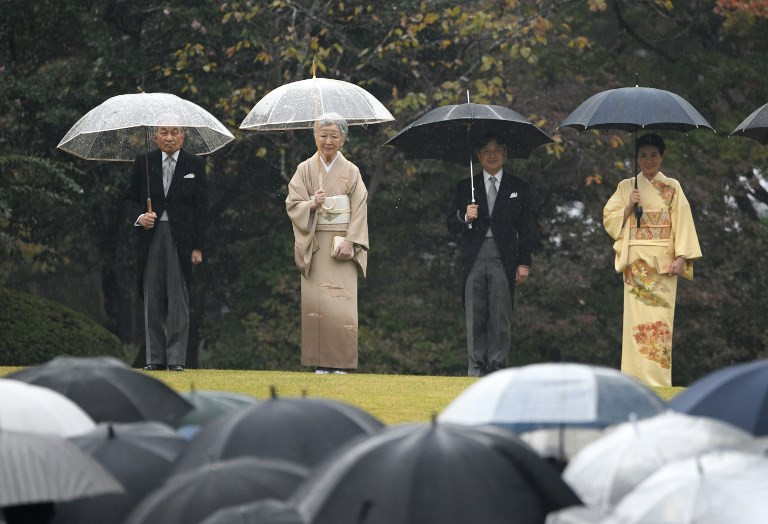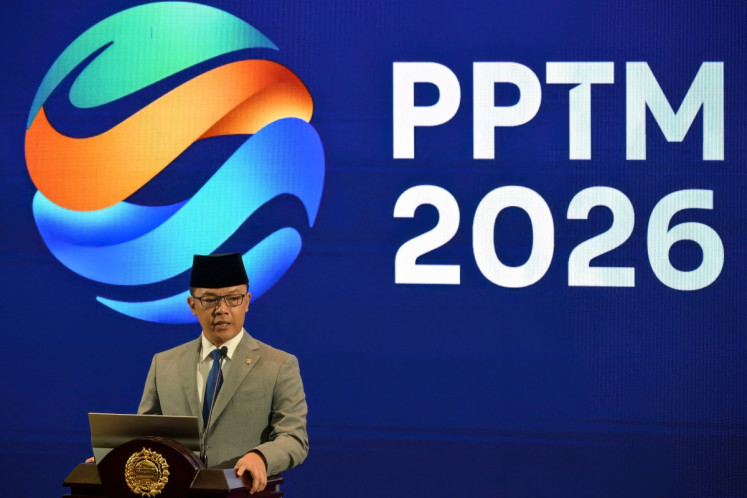Popular Reads
Top Results
Can't find what you're looking for?
View all search resultsPopular Reads
Top Results
Can't find what you're looking for?
View all search resultsTokyo Olympics ceremony, chance for new emperor to strike back
The 2020 Tokyo Summer Olympics in August will be a golden opportunity for emperor-in-waiting Crown Prince Naruhito to outshine the appearances of Prime Minister Shinzo Abe at the closing ceremony of the 2016 Rio de Janeiro Olympics and the United Kingdom’s Queen Elizabeth II at the opening ceremony of the 2012 London Olympics.
Change text size
Gift Premium Articles
to Anyone
T
he 2020 Tokyo Summer Olympics in August will be a golden opportunity for emperor-in-waiting Crown Prince Naruhito to outshine the appearances of Prime Minister Shinzo Abe at the closing ceremony of the 2016 Rio de Janeiro Olympics and the United Kingdom’s Queen Elizabeth II at the opening ceremony of the 2012 London Olympics. The Imperial family has 15 months to prepare itself for the Tokyo Olympics’ opening ceremony.
I am certain PM Abe has a well-prepared plan for Japan to benefit from the global sports event. Thus, the Summer Olympics, beyond demonstrating the country’s mastery of the most advanced technology and its athletes’ achievements, will likely showcase Japan’s crucial role on the world stage despite the chronic problems of an
aging population and frequent expressions of hostility of its neighbors.
A special appearance by Naruhito, I humbly propose, would convince the world that Japan is no longer a former brutal colonial power, but a nation that has and will continue to greatly contribute to the world. Maybe I have watched too much of HBO’s Game of Thrones. Nevertheless, I think the role of the Harvard, Oxford and Tokyo University-educated future empress, Masako, is crucial in changing Japan’s male-dominated culture.
On May 1, Naruhito will be crowned Japan’s newest emperor. He will replace his father, Akihito, who will abdicate on April 30 after 30 years on the throne. Akihito has consistently demonstrated his remorse to Japan’s former colonies. His father, the late Emperor Hirohito, was accused of being a war criminal by the West, China and South Korea. Born on Feb. 23, 1960, Naruhito cannot be the target of criticism; he was born 15 years after Japan’s defeat in World War II.
The United States-drafted Constitution makes it clear that the emperor should hold no political power and that his duties are purely ceremonial. Yet, the new emperor can still be a moral voice for the citizens of the world’s third-largest economy.
Led by Abe and the ruling Liberal Democratic Party (LDP), calls are mounting to revise the Constitution — to make it more realistic and relevant to current geopolitical developments and Japan’s strategic role in global affairs. China and South Korea strongly oppose such a revision, fearing a revival of Japanese militarism. Many Japanese also recoil at Abe’s plan.
The new empress would be instrumental in winning the hearts and minds of the Japanese as well as the global community. So, it would be more than a welcome sight for the Japanese especially if their emperor is accompanied by Masako at the opening ceremony. This is the right time for the upcoming emperor to prove his oft-cited promise to Masako, ”You might have fears and worries about joining the Imperial household. But I will protect you my entire life.”
Combined pressure from the rigid Imperial household and public expectations that she produce a male heir are often cited as the main causes of former diplomat Masako’s “adjustment disorder” problem.
The couple’s daughter, Aiko, was born in 2002, nine years after their marriage in 1993. Japanese tradition only allows for a prince on the throne. Naruhito’s younger brother, Fumihito, is scheduled to be made the new crown prince in April next year.
As Aiko is not allowed to succeed her father, the position of crown prince will fall to Fumihito’s son Hisahito.
On her 55th birthday last December, Masako promised to work hard and to do her best “so I can be of service to the Crown Prince and contribute to the happiness of the people”.
However, as quoted by Asahi Shimbun daily, Masako admitted, “I do feel uneasy about to what extent I will be able to be of service.”
Amid Japan’s aging and declining population, Abe has tried to reform the rigid immigration law to make it easier for foreign workers, both highly educated and unskilled, to enter Japan’s labor market. Japan, however, is is still very reluctant to be more open to foreigners. It is also unwilling to learn from the steady achievements of other countries, such as Singapore, in recruiting young foreign talent.
As part of next week’s celebration to welcome the new emperor, the Japanese will enjoy a 10-day Golden Week vacation from April 29 to May 6. Nearly 200 guests are reported to have been invited to the coronation.
The 59-year-old emperor will likely continue his father’s good track record in diplomacy. Japan needs a strong role model, and politicians will never be able to take up that role. His nation, as well as other countries including ASEAN, have high expectations of the new emperor.
Naruhito’s public appearance at the Tokyo Olympics would be a great chance for him to show the world that Japan is not all about its dark past, but rather a vital part of the global village.











